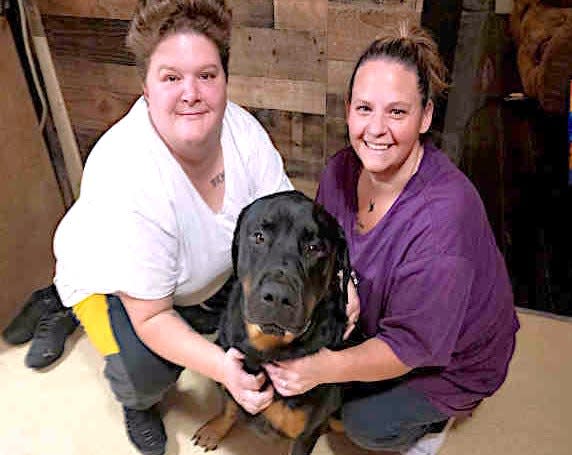Southern Tier family didn't have money to fight dog's cancer. Enter the Magic Bullet Fund
Jessica Cole, of Binghamton, lost her sister to lymphoma — cancer of the lymphatic system — five years ago.
So when she found out recently her beloved Rottweiler, Bruce, also had the disease, Cole was understandably devastated.
"I felt like it was a cruel joke that was being played on me. I felt physically ill," Cole said. "I just didn’t understand how I could first lose my sister and now my beautiful boy Bruce was facing the same exact thing."
Thankfully, the veterinary oncologist was confident Bruce's lymphoma was treatable — but treatment was expensive, more than a family with limited means could afford.

Then Cole came across the Magic Bullet Fund, an organization focused on raising money to help families pay for treatments for pet dogs and cats diagnosed with cancer.
"I applied and was accepted for help from them. From the start they have been amazing," Cole said. "The Magic Bullet Fund has really eased so much burden and worry."
The Magic Bullet Fund's origins, and its goals
In 1992, Laurie Kaplan rescued and adopted an 18-month-old Siberian Husky named Bullet.
In 2000, at 9-years-old, Bullet was diagnosed with lymphoma. Thanks to treatment and a special diet, Bullet's cancer went into remission and he lived to be almost 14.
Inspired by her own experience, Kaplan decided to launch an organization that would help other pet owners facing cancer diagnoses with limited resources. In 2005, the Magic Bullet Fund was born.
"I write books about pets and cancer with an amazing veterinarian in California. In 2004, when I told her my plans to start the Magic Bullet Fund, she said, 'It will never work,'" Kaplan said. "But I was determined to try, and I told her, 'That’s okay, then I will just help a few dogs and close it down.' Now, 18 years later, we have helped almost 900 dogs and cats."
Transportation Lacking 'pizzazz'? Here's what NY readers said about those regional license plate designs
The Magic Bullet Fund will help families if there's a good chance a pet will survive at least nine months with treatment, but a much shorter time without treatment.
The organization provides assistance nationwide and works directly with veterinarians providing cancer treatment. Fundraising campaigns for each pet, which normally last 60 days, almost always hit their goals, Kaplan said, and the Magic Bullet Fund can often help in other ways.
"Typically, we fundraise for five to ten pets at a time. Some people like to donate for a specific pet, others donate to the general fund," she said.
"If there are enough funds in the general fund, it also provides a grant occasionally," Kaplan said. "We can do this for a pet who requires cancer treatment immediately and cannot wait for a fundraising campaign to bring in donations."
The organization is a 501(c)(3) nonprofit and contributions are tax-deductible. Any donations not used for the pet they were donated for will be used to help another pet fight cancer, Kaplan said.
Bruce's story, and his outlook
Cole adopted Bruce when he was two months old, and at age 4, he's still a puppy at heart, she said.
He loves hugs and when Cole was bending over recently to give him one, she discovered a large lump on his throat.
With her sister's fate in the back of her mind, Cole took Bruce to the vet in September, and a biopsy confirmed her worst fear — the lump was indeed cancerous.

With the financial support of the Magic Bullet Fund, Bruce has had half of 16 scheduled treatments, and is responding well, Cole said.
"He is doing so great. He has had no issues with any of the chemo," she said. "He is in remission right now but does need to continue on and finish the full course of treatment in order to have the best shot at keeping him in remission. That is why it is so crucial to raise donations for Bruce."
Bruce's fundraising campaign is about a third of the way toward its goal of raising more than $9,000, and the deadline is looming.
In addition to the promotional efforts the Magic Bullet Fund does with all its campaigns, Cole is sharing Bruce's story on her own social media to help generate support.
"Cancer is a terrible disease that does not care who or what it affects," she said. "No one is ever prepared for this. We are doing everything in our power to save our boy.
Healthcare New York 2023 hospital ratings: How did yours rank in safety, quality?
"The Magic Bullet Fund was our ray of hope when we had nothing. The fund has been a literal lifesaver for our Bruce so far," Cole added. "We are close but still have so far to go. This sweet boy deserves to have more good days and years. Please help us give that to him."
To learn more about Bruce's story and to support his cancer treatments, go to fundraise.givesmart.com/vf/BRUCEC.
For more information about the Magic Bullet Fund, including how to donate, or how to seek help from the organization, go to themagicbulletfund.org.
Follow Jeff Murray on Twitter @SGJeffMurray. To get unlimited access to the latest news, please subscribe or activate your digital account today.
This article originally appeared on Elmira Star-Gazette: Organization helps Binghamton family pay for dog's cancer treatments

